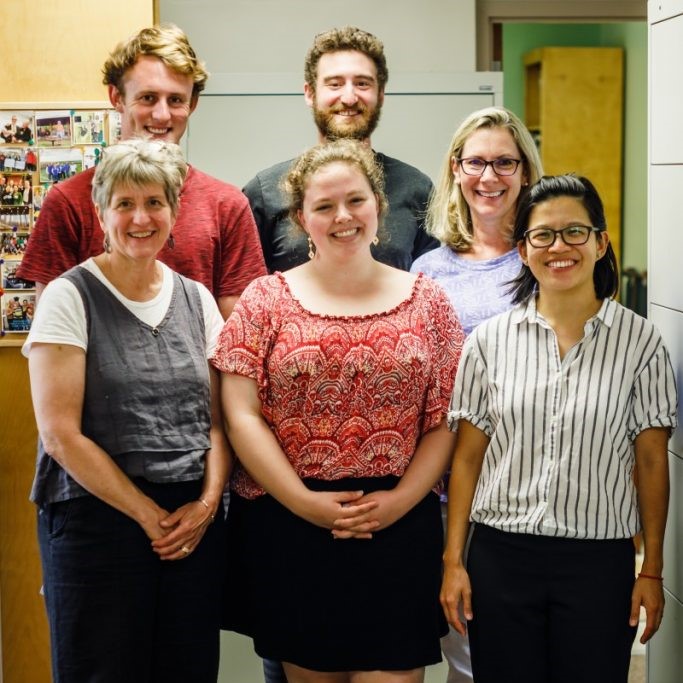Now that it’s officially fall, let’s look back to summer with two final blog posts in a series that highlights the experiences of Privilege & Poverty Interns as they learned and worked with local and national social services.
This post shares reflections from my conversation with Anna Durning, ’21, who worked at the Open Door Clinic this summer.

Photo by Jason Duquette-Hoffman.
In the U.S.A., not too many people are in the business of trying to go out of business.
But that is exactly what Anna Durning ’21 said she’d love to see – a future where the organization can close their doors because their clients are insured.
The Open Door Clinic is a free health clinic for un- and under-insured adults in Addison County (walking distance from campus!). Recently, the organization has served increasing needs among non-English speaking patients. Migrant farm workers, who keep Vermont’s dairy industry afloat, for example, comprise 60% of the organization’s total patient population.
Often, language and cultural barriers make it difficult for the proper medical attention to be administered. This is where Anna, and a cadre of Middlebury volunteers from both the college and the town, step in.
Anna studied abroad in Chile in the spring of 2018, and got to work translating for Spanish speaking patients soon after she returned.
“I’ve always wanted to get to the point where I can have a conversation with someone,” said Anna.
She translated once or twice a month, usually just at the clinic. But this summer, as a Privilege & Poverty Intern with the CCE, she was able to participate in and experience the clinic at a profoundly deeper level: “I had a lot more interaction with patients – I was taking calls all day with people.” Because her time was funded by the college as a full-time internship, Anna had more hours per week at the clinic than most other staff.
“I got to see how the clinic is put together. [There are] three clinical hours per week in Middlebury – so we need to get all the patients, the medical providers there; I got to see and do the behind the scenes work.”
“I had a lot more interaction with patients…I got to see how the clinic is put together.”
Anna Durning, speaking of the opportunities provided by a full-time internship.
It’s any adminstrator’s nightmare: aligning up to three or four schedules together, in a three hour period, every week. But thanks to the dedication of the Open Door Clinic’s network of staff and volunteers, the clinic has grown from humble beginnings to a powerful health-providing force.
In 1990, the Open Door Clinic operated in a bus purchased with a grant from Ben and Jerry’s. Today, the organization holds more than seven clinics each month throughout Addison County. It visits 35 farms, eight orchards, and 270 Latin American farm workers each fall.
But this growth comes with a caveat: they wish it wasn’t necessary. And it can seem at times like fighting an endless battle that shouldn’t even have to be fought.
Indeed, in many conversations with social service providers I had this summer, a similar weariness was warily admitted in various forms.
The work of social services is raw and emotionally taxing. But what is perhaps harder to deal with is the fact that it is not going away any time soon – systemic change takes time and constant effort, including meeting direct needs in the meantime.
“There were a lot of moments that I was part of where I think an impact was had. You know, someone called and was like ‘I’ve been out of insulin for months’ – and I was able to connect them to a resource.”
Anna Durning
“There are a lot of moments that I was part of where I think an impact was had. You know, someone called and was like ‘I’ve been out of insulin for months’ – and I was able to connect them to a resource.” said Anna, reflecting on an earlier discussion about the value of each of the intern’s individual work.
“I can tell that it’s impactful, but don’t necessarily see how I am specifically important to that.”
“Like a shock troop, a replaceable person in the battle?” I said.
“Yeah, exactly.”
These are our moments of doubt. When we call the value and effectiveness of our own work into question. Is this valuable? Will this change this world for the better?
I have to believe that this work may have some respite or conclusion. If not in my lifetime, then in an imaginable future. To do anything else would be to give into despair – the immobilizing kind that forces one to turn inwards and forget how to turn empathy into action.
Stable housing. Education. Healthcare. Access to clean water and healthy food. Domestic safety. All of these seem like basic stepping stones to a good life, the pillow and the blanket and the bed that enables a sound American Dream.
Yet all over the country – and even here in Addison County – there are people in the business of providing these necessities because they are not a given. But these folks, they’re in the business of trying to get out of business.
